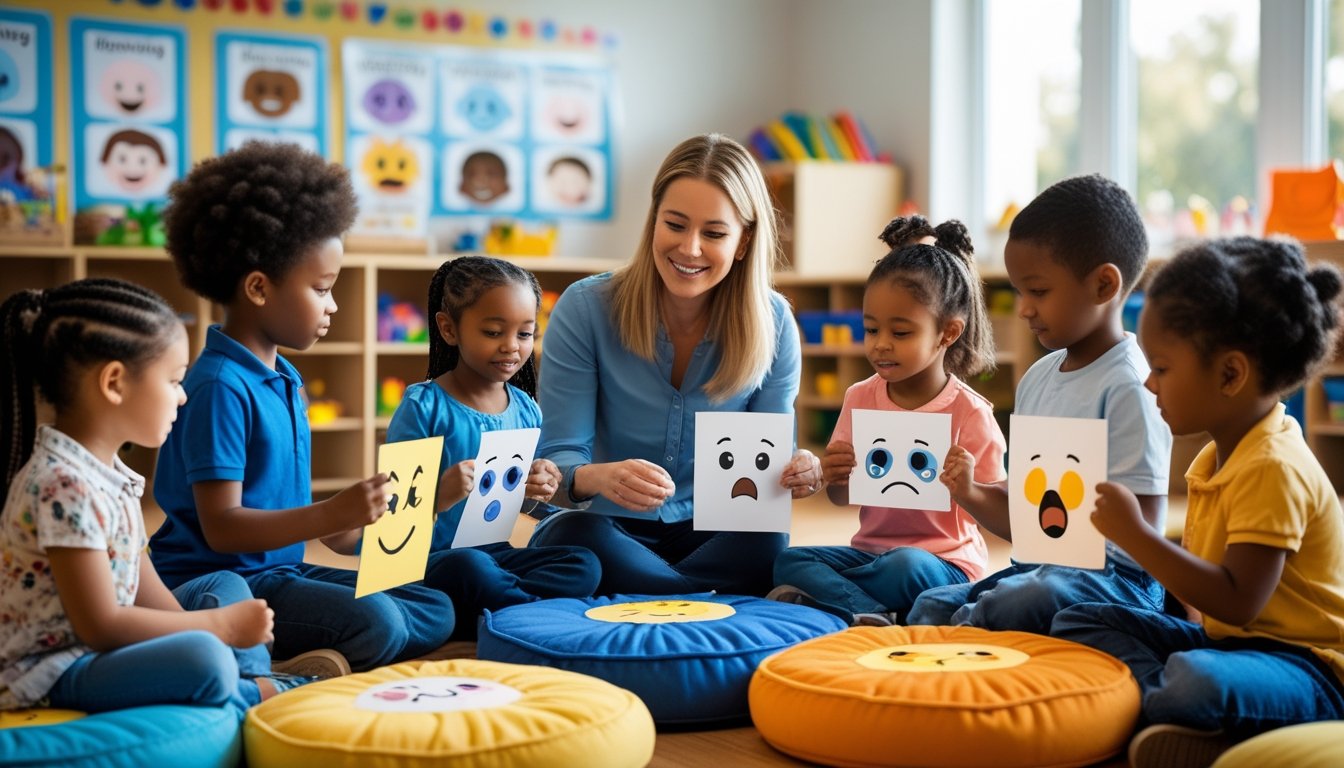Late updated: 06 Aug 2025 13:08
Written by:
Tips For Supporting Children's Emotional Development: Effective Strategies for Parents and Educators
Nurturing children's emotional development is a vital part of parenting. As caregivers, we aim to equip our young ones with the skills they need to navigate their emotions effectively. By creating a supportive environment and teaching emotional regulation, we can foster resilience and emotional well-being in our children.

Observing a child understand and express their emotions is truly rewarding. From learning to cope with life's challenges to interacting positively with peers, emotional health plays a pivotal role in their overall development. Understandably, it can sometimes be difficult to know where to start or how best to support this growth.
In our discussion, we will explore practical strategies to enhance children's emotional development. Encouraging open communication, acknowledging their feelings, and recognising signs of distress are key steps in helping our young ones thrive. Engaging with children in a manner that promotes emotional resilience can significantly impact their future interactions and mental health.
Key Takeaways
- Foster emotional regulation for resilience
- Encourage open communication about feelings
- Recognise and address signs of emotional distress
Essential Strategies for Supporting Children's Emotional Development
Supporting children's emotional development involves understanding their needs and creating environments that nurture their emotional well-being. We can achieve this through tailored approaches that cater to different developmental stages and by encouraging open emotional expression.
Understanding Emotional Developmental Stages
Recognising emotional developmental stages is key to properly supporting each child’s growth. Children experience various stages, from basic emotional responses in infancy to more complex emotions as they grow. Knowing these stages helps us tailor our support accordingly. For example, infants express emotions through basic cues like crying. Toddlers start identifying emotions like joy and frustration. By preschool age, children begin to understand empathy and can articulate feelings. Appreciating these stages allows us to create age-appropriate responses and support that are both relevant and effective in nurturing emotional growth.
Creating a Safe and Supportive Environment
A safe and supportive environment is essential for emotional development. We should prioritise creating spaces where children feel secure to express themselves. This means providing a stable routine and clear rules, which help children feel secure. Encouraging positive interactions and avoiding criticism fosters trust and comfort. We can facilitate this environment by being attentive to their cues and being consistently available for emotional support. Offering choices also empowers children and promotes decision-making skills. By maintaining a caring atmosphere, we help children build the confidence to explore their emotions without judgement, contributing positively to their emotional well-being.
Encouraging Emotional Expression Through Play and Role-Play
Play and role-play are effective tools for encouraging emotional expression. Through imaginative play, children can explore different emotions and scenarios, which enhances both emotional and social skills. For instance, role-play with dolls or action figures allows children to act out feelings and situations they encounter. This process helps them understand different perspectives and develops empathy. Moreover, play offers an indirect way for children to express emotions they might find difficult to articulate. Facilitating regular play opportunities and participating as facilitators ourselves can help guide their emotional understanding and provide valuable support in their emotional journey. By integrating these strategies, we lay the groundwork for healthy emotional development and connection.
Building Key Emotional Skills in Children

Children's emotional development forms the foundation for their ability to navigate life's challenges. Our focus is on teaching them emotional regulation, building empathy, and enhancing problem-solving abilities to strengthen resilience.
Teaching Emotional Regulation Techniques
Emotional regulation is essential for children to manage their feelings effectively. We can start by helping children identify their emotions. Tools like emotion charts or feelings diaries can aid in this. Once they recognise their feelings, we teach them strategies such as deep breathing or counting to ten. These simple techniques can help during moments of frustration or anxiety.
Interactive activities, such as role-playing, allow practice in a safe environment. When children enact scenarios, they learn how to express emotions appropriately. Moreover, rewarding the use of positive regulation techniques reinforces these skills. It's vital to create a supportive atmosphere where children feel safe and acknowledged.
Modelling Empathy and Emotional Vocabulary
For children to grasp empathy, we should serve as examples. Demonstrating empathetic behaviour in everyday interactions can teach children to understand and share the feelings of others. It's about showing concern as well as listening actively.
We also need to equip children with a rich emotional vocabulary. The ability to articulate feelings precisely can reduce frustration. Incorporating books and storytelling into daily routines can introduce new emotion words and concepts, broadening their understanding.
Discussing our emotions openly helps normalise sharing and makes empathy a natural part of conversation. Remember, the more fluent a child is in the language of emotions, the better they can connect with others.
Fostering Problem-Solving and Resilience
Problem-solving skills empower children to face difficulties confidently. Encouraging children to think of various solutions to a problem develops their ability to adapt. We can use real-life challenges, broken into manageable steps, to practice these skills.
Resilience comes from overcoming setbacks, so it's important to let children experience challenges and learn from them. Support and guidance are crucial during these times, providing a sense of security while they explore solutions.
Introducing games that require planning and strategy can be both educational and engaging. They promote creative thinking and perseverance, key elements in fostering resilience. Building these skills will prepare children for an increasingly complex world.
Frequently Asked Questions

We aim to address common queries about nurturing children's emotional well-being during their formative years. With insights from both research and practical experience, these responses offer specific strategies and examples for fostering emotional growth.
What strategies can be employed to enhance emotional development in early childhood?
Early childhood can be a dynamic period for emotional growth. Implementing routines provides stability, while role-playing various scenarios offers young children a chance to explore emotions. Additionally, literature that highlights empathy can serve as significant tools in enhancing emotional development.
What methods are effective for promoting social-emotional growth in educational settings?
In educational settings, creating a supportive environment is key. Activities that encourage cooperation, such as team projects and group discussions, foster social skills. Facilitating open conversations about feelings and interactions can also drive social-emotional understanding among peers.
How can educators provide positive guidance to foster social and emotional development?
Educators play a pivotal role by modelling respectful communication and active listening. Encouraging children to express themselves and validating their emotions helps in creating a reliable framework for them to navigate social interactions.
Can you provide examples of social-emotional development within early years education?
In early years education, activities like "circle time" allow children to share their feelings, building a sense of community. Story-based activities where children act out different characters can illustrate empathy and understanding of diverse perspectives.
Why is social-emotional development crucial during the early stages of childhood?
Social-emotional development forms the foundation for how young children understand themselves and others. In these early stages, kids learn to manage emotions and establish relationships, skills essential for later life success, both academically and socially.
What are some age-appropriate activities to support emotional and social development in children aged 3-5?
For children aged 3-5, interactive games that require turn-taking can teach patience. Storytelling sessions where they discuss characters' emotions help in identifying and naming feelings. Arts and crafts can also be an expressive outlet for emotions, serving a dual role in both creativity and emotional exploration.
